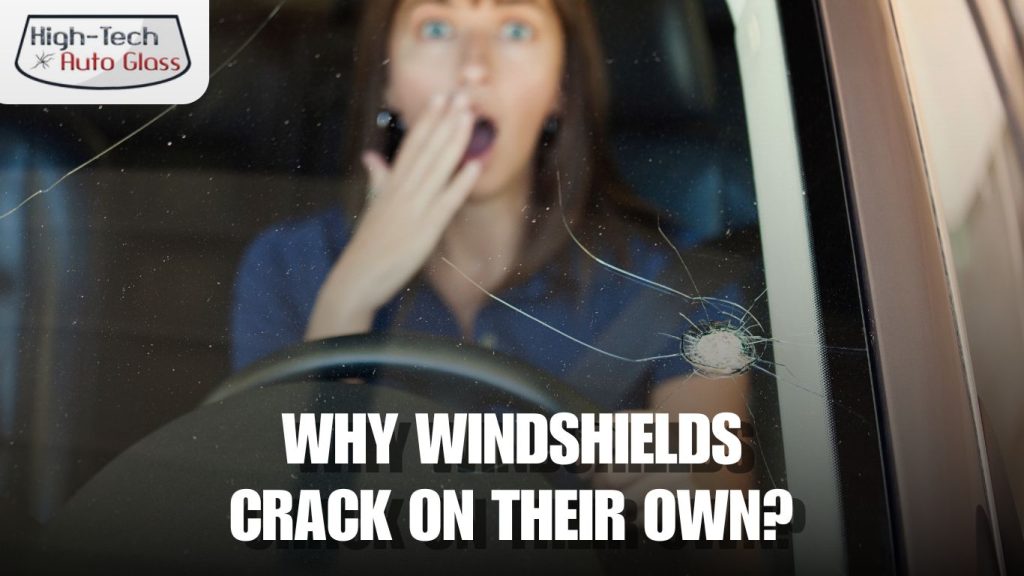Can Windshields Crack on Their Own?

The windshield may seem like just a window, but it’s a serious component of your vehicle, not just for clear vision but also as an essential part of its structural integrity. The car windshield supports the roof, helps the airbags deploy correctly, and protects passengers from external elements and in the event of an accident. Despite its tough construction, typically using laminated glass, the windshield may be vulnerable to damage, such as a chip or crack, which can compromise its structural and functional roles.
While it might seem unlikely, windshields can crack seemingly on their own. These spontaneous cracks often cause cracks to develop from minor imperfections in the glass or installation that worsen over time under normal driving conditions. Factors such as extreme temperature changes, inherent flaws in the glass, or improper installation can cause cracks to initiate. Understanding these spontaneous cracks is important for maintaining your vehicle’s safety and functionality.
Identifying and addressing windshield cracks early can prevent them from expanding and causing further complications. A small crack can quickly turn into a large one, obstructing your view and potentially leading to costly replacements. You may even feel the crack spreading as it grows. Various factors can cause a crack, even though windshields are made from durable laminated glass, designed to withstand impact.
Regular inspections and understanding the causes of windshield damage, including whether windshields can crack on their own, can help vehicle owners manage and mitigate the risks associated with windshield integrity.
Common Causes of Windshield to Cracks
Windshield cracks can arise from a variety of sources, each linked to the environmental, operational, and physical conditions the vehicle experiences. Here’s a closer look at some common culprits:
Temperature Fluctuations and Thermal Stress
Temperature differences are notorious for causing windshield glass to expand and contract. This movement can create significant stress within the glass, particularly if there are extreme changes in temperature, such as using the defrost feature on a frosty morning or the air conditioner in cold temperatures. This thermal stress, often caused by sudden changes in temperature, might be due to the way heat affects the glass and can lead to the development of a crack on your windshield, which can expand and become more severe over time.
Impact from Road Debris and Minor Collisions
Flying debris from the road, such as rocks or other hard materials kicked up by passing vehicles, can strike the windshield with enough force to cause chips or even crack starts. Even minor collisions, which might initially appear insignificant, can jar the glass sufficiently to create visible damage or a broken windshield. These impacts are unpredictable, and if your windshield isn’t checked early, they can lead to further damage. For more insights on preventing windshield damage, you can explore our related blogs to stay informed about common causes and solutions.
Structural Weaknesses and Improper Installation
Sometimes, the windshield glass itself may have inherent weaknesses due to flaws in its manufacturing process. These imperfections can compromise the glass’s strength, making it more susceptible to damage under normal conditions. If the windshield isn’t installed properly, even slight pressures or impacts from debris on the road can lead to significant cracking.
Intense Sunlight
Exposure to the intense hot summer sun can also harm your windshield. When a vehicle is parked in direct sunlight, the glass heats up and expands, particularly at the edges, which absorb heat more rapidly than the cooler center. This sudden and extreme change in temperature can be one of the reasons behind windshield damage, as the glass undergoes uneven expansion, stressing the glass and potentially leading to a stress fracture. These cracks often start at the windshield’s perimeter and can spread across the field of vision, becoming more noticeable when it’s really hot outside. It’s important to fix the windshield quickly before the damage worsens.
Accidental Impacts
Accidents, whether from a stray baseball, a rock thrown by a lawnmower, or any other unexpected external force that might hit the windshield, can lead to cracks and severe windshield damage. These accidental impacts are sudden and can create various crack patterns, depending on the angle and speed of the impact. In some cases, temperature fluctuations that heat the metal frame of the car can also contribute to stress on the glass. It’s essential to drive safely to minimize the risk of such unexpected incidents and protect your windshield from potential damage.
High Speeds or Pressure Differences
Driving at high speeds, or sudden changes in pressure caused by passing large vehicles, can impose additional stress on the windshield. These pressure differences can flex the windshield subtly, which over time may result in cracks, particularly if there are already minor damages or weak spots present. Additionally, debris that hits your windshield at high speeds can exacerbate these issues, as every impact that hits your windshield increases the risk of further damage.
Understanding these causes can help drivers take preventive measures and seek timely repairs to maintain the integrity and safety of their windshields.
Choosing the right glass repair service
Key Points to Consider while choosing the right glass repair service:
- vehicle maintenance: Considered an essential part of maintaining the safety and integrity of your car’s glass.
- covered under warranty: Many services, including repairs on a windshield safe area, might be covered under warranty.
- Auto insurance: Assistance with handling auto insurance claims for windshield damage.
- Glass repair and replacement: Known for their expertise in both glass repair and replacement, ensuring long-term solutions for all clients.
- Spontaneous windshield crack: Addressing even the smallest crack in the windshield quickly to prevent further damage.
- Chipped windshield: Specialized services for any type of crack, including floater cracks and more.
- Layers of glass: Utilizing the best materials to repair the multiple layers of glass found in modern windshields.
High Tech Auto Glass not only provides repair services but also educates customers on maintaining the integrity of their windshields, helping to prevent issues like excessive heat damage or impacts from rock or debris, which are the most likely to happen incidents. Their commitment to providing the best possible service, including expert Windshield Replacement in Phoenix, makes them a trusted name in the Phoenix area for all auto glass needs.
Conclusion
Understanding the causes and implications of windshield cracks is important for maintaining the safety and integrity of your vehicle. A stress crack in the windscreen is not just a cosmetic issue; it can significantly impair visibility and compromise the structural integrity of the vehicle during accidents. Being aware of what causes windshield damage and the steps to take immediately after you get your windshield damaged can help prevent small issues from escalating into bigger, more dangerous problems.
Even the tiniest crack at the edge of the glass can cause the glass to expand spontaneously, especially if it is located near the right corner or across the bottom where the glass meets the metal frame. This expansion often leads to further glass breakage and may turn a small chip into a large crack that spans the side of the windshield. While DIY windshield repair might seem like an option, it’s important to address the issue promptly to prevent more serious damage.
Promptly addressing these damages ensures the longevity and safety of your vehicle’s glass, which is a serious part of the vehicle. If left unchecked, a crack inside your car’s windshield could cause the windshield integrity to fail during a collision, leading to serious safety risks. Proper windshield installation by a skilled technician is critical to preventing such failures. It’s also essential to note that some windshield issues could be a warranty concern, particularly if the car windows or glass expands due to manufacturing defects. There’s always a reason to stay vigilant and address windshield cracks promptly, ensuring the safety and longevity of your vehicle’s glass.
Frequently Asked Questions
What should I do if I notice a small crack in my windshield?
If you spot a small crack, it’s important to address it as soon as possible. Small cracks can quickly grow larger, especially with temperature changes or during driving. Cover the crack with clear tape to prevent dirt from getting in and seek professional advice to determine if a repair or replacement is necessary.
How can I prevent my windshield from cracking?
To minimize the risk of your windshield cracking, avoid parking your car in direct sunlight for extended periods, maintain a safe distance from trucks or vehicles that may throw up debris, and use proper tools when removing ice or snow.
Why does my windshield crack when it gets really cold?
Windshields can crack due to thermal stress when exposed to extreme temperature changes. If it’s very cold and you turn on the heat too quickly, the rapid expansion of the glass can cause it to crack.
Can a windshield crack get worse over time if I ignore it?
Yes, absolutely. Even a small crack can spread and compromise the structural integrity of the windshield. Changes in temperature, rough roads, or even the vehicle’s vibration can cause the crack to grow.
What’s the difference between a windshield chip and a crack, and does it matter?
A chip is usually a small spot where a piece of debris has hit the glass, often not larger than a quarter, while a crack is a distinct line that runs across the windshield. Both can potentially worsen and lead to bigger issues, but cracks generally pose a greater risk and might require quicker action.
Is it safe to drive with a cracked windshield?
Driving with a cracked windshield can be dangerous, especially if the crack obstructs your view. It also weakens the windshield’s structure. It’s best to get it assessed by a professional to determine if it needs immediate replacement.
Will my auto insurance cover the cost of windshield repair?
This depends on your insurance policy. Some policies cover windshield repair or replacement, often without a deductible. It’s worth checking with your insurer, especially if the damage was caused by road debris or a related incident.
